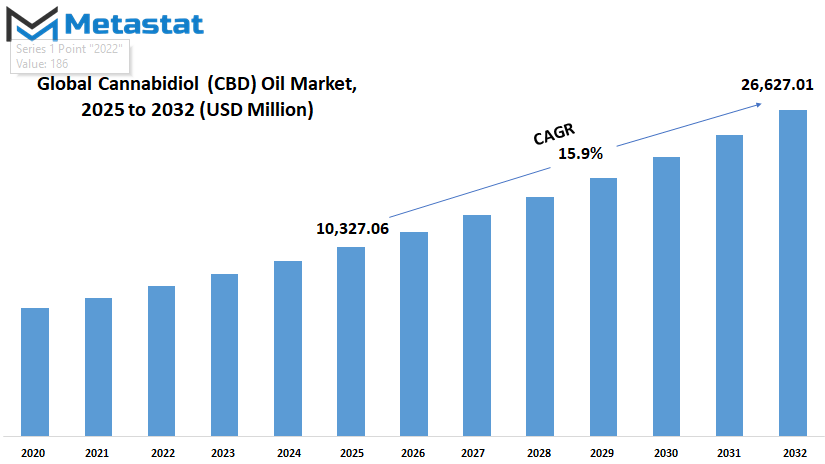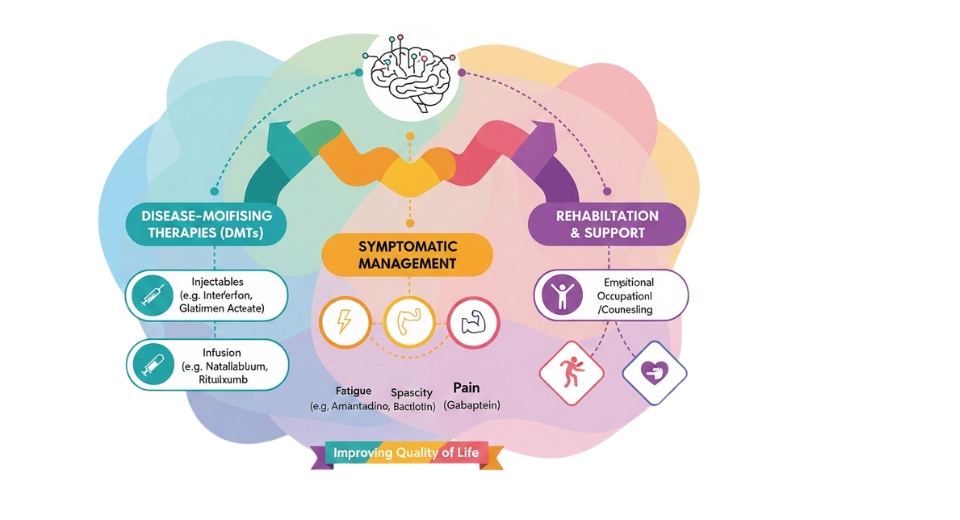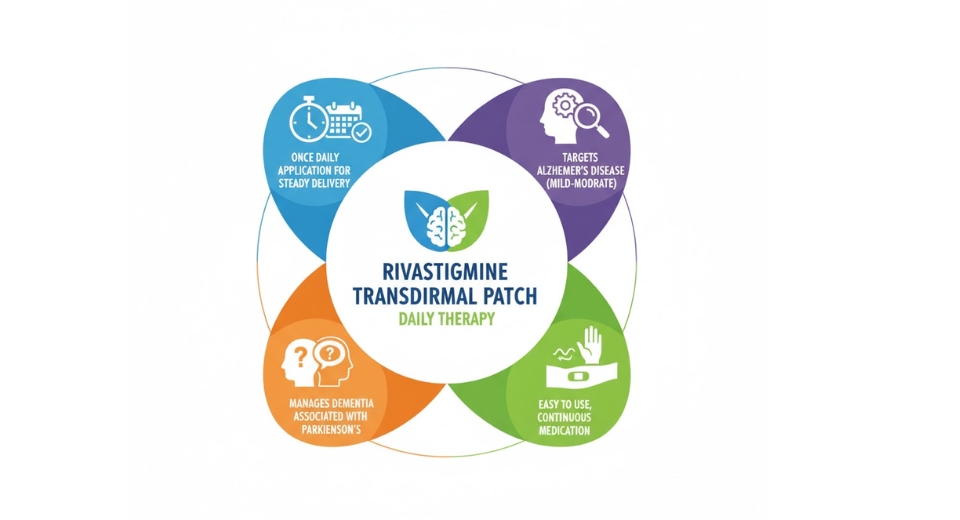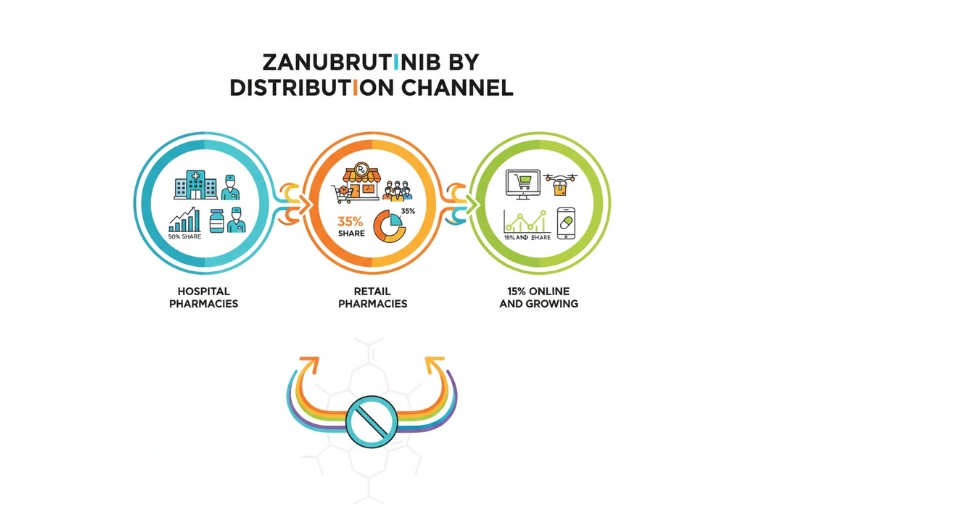MARKET OVERVIEW
The global cannabidiol (CBD) oil market occupies the domains of healthcare, wellness, and pharmaceuticals and presents a variety of products derived from one of the active components in cannabis: cannabidiol. The scope of this market also includes extraction, formulation, and sellable presentation of CBD oil in the therapeutic, cosmetic, and dietary supplement markets. The path of this market is being carved by the regulatory frameworks, and the market is working within these legal boundaries to satisfy consumer demands for plant-based wellness alternatives.
CBD oil has some therapeutic efficacy attributed to its usage, which branches across many industries. The applications for the global cannabidiol (CBD) oil market will include medical use, specifically in the treatment of conditions such as chronic pain, anxiety, and neurological disorders; provisions for the pharmaceutical industry will incorporate CBD-based formulations into prescribed medications of proven purity, correct dosage, and regulatory compliance; and wellness, where CBD oil will be integrated into supplements, beverages, and skincare that promote health.
As product innovations develop, firms within the global cannabidiol (CBD) oil market will research further extraction and purification methods that improve bioavailability and potency. The extraction process gives several methods consideration, CO2 extraction and ethanol-based extraction, that can purify and concentrate CBD oil, thus influencing product quality. Standardization of these methods will be prioritized as manufacturers work to consistently formulate products that are safe and effective. The advancement of the research front will also clear abysses of understanding regarding the inner workings of the CBD-human endocannabinoid system interface, an aspect that will affect product development further down the line.
Regulatory scrutiny will be a determinant in the global cannabidiol (CBD) oil market, as governments will come up with guidelines delineating production, distribution, and marketing of CBD products. Adhering to these policies will determine the extent to which companies are able to enter the market and develop CBD-based solutions. The legal status of CBD oil will vary between regions, thus restricting availability to consumers differently. Businesses will need to adjust their tactics based on legislative obligations as authorities come along with the further refining of policies concerning cannabinoid-based commodities.
The rapidly expanding market shall soon exploit diverse distribution channels including e-commerce, retail, and pharmacy. Digital marketplaces will put a major share of CBD oil into the hands of consumers on a worldwide basis, whilst the much older form will avail selective CBD-infused products. Direct-to-consumer brands will do outreach on the web, educating consumers on the benefits of CBD oil, with pharmaceuticals nourishing the availability of prescription formulations further down the ladder.
Global cannabidiol (CBD) oil market is estimated to reach $26,627.01 Million by 2032; growing at a CAGR of 15.9% from 2025 to 2032.

GROWTH FACTORS
The global cannabidiol (CBD) oil market is developing in large leaps as awareness among consumers continues rising. Increasingly people are becoming informed about the several wellness and medical benefits of CBD. This has changed the minds of many people who are now demanding natural alternatives that will help relieve stress, pain, and other health conditions. The demand for CBD has made it necessary for the manufacturers to continue investing in research and development to further complement their penetration within the health and wellness industry.
The growing legal access of cannabis markets is one of the important factors contributing to this growth. As many governments around the world relax their restrictions and implement laws that will favour products derived from hemp, accessibility improves to a great extent. Regulatory approvals are paving the way for companies to introduce more diversified offerings, such that CBD will be available for almost every consumer. This is not just about individual behaviour, however; it also opens up opportunities for businesses to venture into other lines of products, cultivating a competitive market that caters to different preferences. There is definitely more commercialization of CBD products to come as new areas open up for this venture.
However, even under the bright sun, there are clouds. Stringent regulations and ongoing legal uncertainties still create smoke screens in several areas. While some countries and states have legalized CBD completely, others maintain laws that restrict its distribution and use. Such differential treatment of the laws creates many complications for the companies which are looking to get access to newer markets, thereby slowing down the pace of expansion for the entire industry. Another principal hurdle to the expansion of this industry is the massive flow of misinformation and lack of standardization in quality control. Most consumers still have no idea at all about the safety and effectiveness of CBD because of the contrary facts available. The result of this clarification gap is that many people might hesitate to have CBD as part of their wellness solution.
In general, the industry would be expanding further through innovative products incorporated into every other thing, from beverages to skin care and pharmaceuticals. More innovation would intrigue the public to a wider appeal, targeting those who may not have been inclined toward CBD previously. As more scientific evidence emerges with clearer interpretations of the benefits attributed to CBD, confidence in usage would hence be strengthened and demand further to be multiplied for the manufacture of improved quality-regulated products.
The promising future in the industry may indeed hold many obstacles for the global cannabidiol (CBD) oil market, but increasing acceptance of CBD and constant product innovation has great expectations to the future. Regulation becomes less ambiguous with misinterpretations, and the industry growing forms opportunities for both business and consumers. CBD is expected within a few years to become a very mainstream option in wellness and medicine.
MARKET SEGMENTATION
By Product Type
The global cannabidiol (CBD) oil market is expected to flourish well in near future due to the rising trend towards natural wellness products and changing regulations. One reason more people are turning to alternatives to traditional medicines is due to the buzz about potential benefits associated with CBD oil. To suit the varying needs and preferences of consumers in the marketplace, different products of Full-Spectrum CBD Oil, Broad-Spectrum CBD Oil, and CBD Isolate Oil are made available. New extraction methods and the increasing awareness about cannabinoids are promising features from an industry standpoint because they will likely take the industry forward to transform health and wellness industries on a global scale.
Full-Spectrum CBD Oil has within itself all the ingredients found in the hemp plant; cannabinoids, terpenes, and minimal amounts of THC. According to most users, these components work in tandem to give a stronger effect. This is the type preferred by those who want to experience the full effects of the hemp-derived compounds. Broad-Spectrum CBD Oil is another type consisting of multiple cannabinoids and terpenes but devoid of THC; thus it's the right choice for a person looking to experience the effect of other plant compounds without the side effect of THC. The third type, CBD Isolate Oil, is the purest form because it comes with only cannabidiol and no other components from the plant. This is often selected by those who would prefer exact control over their intakes or want to avoid any traces of THC.
Increasing numbers of uses for CBD oil in wellness and therapeutic purposes give an upward status quo driving demand. Most people are busy taking it the whole day for relaxing, getting to sleep better, and general wellness. Science is studying it in multiple contexts, and as research continues, it may be explored further for new product development. Companies are looking forward to researching innovations for better formulations, higher bioavailability, and product formats like tinctures, capsules, and topical applications.
Looking forward, regulatory changes are going to be critical in shaping the global cannabidiol (CBD) oil market. Regions are beginning to loosen up and allow more access, but several still have to put up a regime. As policies progress, the global cannabidiol (CBD) oil market is bound to witness further investments leading to improvements in standards and better consumer confidence. Brands that focus on transparency, third-party testing, and sustainable sourcing will be seen clearly as winners in an increasingly competitive and/or public space.
Given the growing interests and advances in the scientific community, it is inevitable that the industry will grow further. As campaigns to raise awareness on the product continue and regulations take a clearer position, it is expected that products containing CBD oil will be widely available, ultimately leading to a future where such products are widely considered important parts of wellness and health care routines.
By Source
Increasing awareness of the health benefits of Cannabidiol (CBD) oil along with emerging legal grounds is the reason why the oil is experiencing phenomenal growth at the global level. CBD oil is extracted from two kinds of cannabis plants: hemp and marijuana. From the plant Cannabis sativa which has little content of tetrahyrdocannabinoil (THC), psychoactive substance associated with marijuana, is derived hemp CBD oils and because of this low THC content, hemp products were accepted and legalized in many countries for the cultivation and extraction purposes. The passage of the 2018 Farm Bill in the US, for example, has legalized the sale and farming of hemp products, simplifying cultivation and sales for farmers. All this legal support makes the demand for hemp-derived CBD products huge and prominently featured in the global cannabidiol (CBD) oil market.
In contrast to marijuana-derived CBD oils, they originate from cannabis plants that have higher concentrations of THC. While such products may have medical property, they have different legal standings in the world due to variations in regulations on THC contents. However, even with these strictures, the global cannabidiol (CBD) oil market derived from marijuana continues to grow as more areas accept the application and begin to develop their laws on it.
CBD Oil has enjoyed incorporation into this range of industries through which it comprises a broad range of industries, such as pharmaceuticals, food and beverages, cosmetics, and personal care products. For example, in the pharmacological field, CBD oil is used more and more for its therapeutic effects-in pain and anxiety relief, among others. The food and beverage industry is now brimming with infusions of CBD in its products, in line with the increasing demand by consumers for natural options for health and wellness. The same aisle, if you will, as cosmetics companies-they are quite happy to hock oils infusing CBD for their purported anti-inflammatory and antioxidant capabilities, resulting in a variety of a skin care product.
The extraction methodologies such as CO2 extraction and other solvent extractions have advanced in the quality and efficacy of CBD oil and hence increased interest among consumers. These technological developments have enabled manufacturers to produce high-quality products that meet the diverse needs of consumers.
As the market matures, companies invest in research and developments for the creation and introduction of various innovative products infused with CBD. For instance, Canopy Growth Corporation recently launched a new line of beverages that include CBD, which targets the wellness and relaxation segments of the global cannabidiol (CBD) oil market as an addition to their rapidly growing category of CBD beverages. CW Hemp/CW Botanicals, on the other hand, has introduced a high-potency formulation of CBD oil for chronic pain relief, further gaining market share in the pharmaceutical arena for CBD.
By Application
The global cannabidiol (CBD) oil market is growing continually due to increasing requirements from companies from diverse industries. As people become more aware of the benefits that CBD oils possess, they are revolutionizing solutions in the following industries: pharmaceuticals, personal care, food products, pet care, and finally wellness supplements. The future holds immense possibilities since scientific research is done continuously in finding new possible uses, evolving regulations, and changing consumer interests towards natural alternatives.
In therapeutic and pharmaceutical applications, CBD already has a very well-established role in pain relief, anxiety management, and many other disorders. With this continued research, it would be surprising if it did not expand its footprint further into modern medicine, creating fro the most part more targeted products concerning specific conditions. It could radically alter the scope of accepted treatment for particular conditions concerning the reality of CBD oil being integrated into mainstream treatments. Thanks to the research that is financed by pharmaceutical companies, there will probably be more acceptance of medicines based on CBD in the coming years.
Thus, personal care and cosmetics availed benefits with CBD oil. Although there are skincare products with infusion of CBD which can claim their properties like soothing and anti-inflammatory, the future may establish itself wherein beauty will already adopt a more organic or plant-based ingredients. More consumers would want to acquire wellness-associated benefits rather than pure cosmetic benefits that these products may provide, thus making CBD oil emerge as one of the most sought ingredients for this category.
Food and Beverage companies are producing innovative products with CBD; ranging from infused drinks to snacks and supplements. The future of this segment will see an increase in innovations with more categories of products emerging, as the regulatory framework becomes clearer. The very thought of obtaining CBD in a convenient and enjoyable manner sounds appealing to the health-conscious individual, who tends to favor functional foods over more traditional supplements. Companies in this space are expected to tinker with numerous formulations to deliver better taste, effectiveness, and bioavailability.
The same recognition of CBD oil can also be said for the pet care industry. There is a growing tendency for pet owners to turn to CBD-infused products intended to relieve pains, anxiety, and many other things experienced by animals. More research and clarifying regulations can lead to increased use of CBD products by household owners for pets.
CBD oil is being added as part of its wellness and nutraceutical applications on consumersõ daily supplementation. On the other hand, the case of using CBD as an alternative to natural silicon vitamin or medicine seems to be attractive to some consumers. With the increase in the number of people becoming mindful of general wellness, companies may then create specialized formulations that mix CBD with other beneficial components to enhance its effects.
By End-User
The global cannabidiol (CBD) oil market will be seeing ever-growing opportunities as more industries recognize its potential. And as research is booming, demand for CBD oil is set to increase in the key sectors of healthcare, retail, and clinically- by increasing demand for therapeutic applications. Each of these sectors is molding the market's future with the scientific advancements and changing consumer attitudes that drive the adoption of CBD oil.
In medicine, CBD oil occupies an ever-growing interest due to its possible benefits. Research is underway exploring its use for pain management, inflammation reduction, and improving mental health. The more CBD-related studies develop, the more likely there will be recommendations for using CBD products in varying degrees of acceptance in mainstream medicine. As more pressure for alternative treatment becomes, Pharma organizations continue to forge new formulations embedded with CBD oil. On the other hand, as incidences of awareness grow, healthcare professionals may start adopting more customized treatment programs for modalities that include CBD oil-good for patients who seek natural solutions.
Beyond healthcare, retail customers serve as additional players stimulating market growth. Increasingly, CBD oil wellness products are finding favor among those who understand its benefits. Many are trying to source plant-based alternatives to relaxation, sleep, and general wellness. CBD oil is available in tinctures, capsules, and creams, thereby reaching a wider cohort of consumers. With a change in regulatory scenarios, the retail sector may innovate new product lines to entice natural offerings. If that happens, it would imply a change in consumer behavior, indicating that CBD oils may become a habitual adjunct of everyday wellness alongside vitamins and supplements.
The veterinary space is similarly changing thanks to an ever-increasing interest in CBD oil. Pet owners want alternative ways to help their pets' health, often related to anxiety, pain, or mobility. But as veterinarians are welcoming discussions around the topic of CBD oil as an effective supplement in pets, serious research is now gaining momentum to understand its safety and therapeutic effectiveness. As CBD-based therapies for animals become more personalized, the demand for them is expected to rise accordingly, thus changing treatment paradigms for certain conditions among veterinary practitioners.
This global cannabidiol (CBD) oil market holds bright prospects for innovations and acceptance across these industries in the future. The more scientific knowledge deepens, regulatory frameworks apprehensively evolve, and consumer awareness attains new heights, this market may subsume opportunities it even could not imagine. The ever-sustaining canvas of exploration of CBD oil's benefits suggests that CBD oil will have an even more major impact in healthcare, retail, and veterinary applications. This ensures a bright future where CBD oil becomes indispensable in daily life.
|
Forecast Period |
2025-2032 |
|
Market Size in 2025 |
$10,327.06 million |
|
Market Size by 2032 |
$26,627.01 Million |
|
Growth Rate from 2025 to 2032 |
15.9% |
|
Base Year |
2024 |
|
Regions Covered |
North America, Europe, Asia-Pacific, South America, Middle East & Africa |
REGIONAL ANALYSIS
The depressed demand for Cannabidiol (CBD) oil has been growing steadily across various regions due to changing consumer perceptions, regulatory changes, and ongoing research into its benefits. As the market is expanding, opportunities, and challenges will arise that differ regionally. Various cultural, legal, and economic factors governing CBD oil will influence the global market, making regional analyses pertinent to understanding future growth.
North America, especially the U.S., has been a prominent participant in the global CBD oil development with respect to the industry establishing trends and initiating product development, research, and sales. Established brands in the global cannabidiol (CBD) oil market, along with supportive legislation across various states, and an increasing consumer awareness of the potential benefits of hemp products, have made this region the strongest in the market presently. The Canadian context, with its favorable cannabis laws, has further empowered the entire field of CBD oil products. In any event, Mexico is slowly giving in to the prospect of CBD-based products, with on-the-move regulations likely to open up more business opportunities for companies and consumers.
Another emerging market is Europe, where countries such as the UK, Germany, and France have experienced increasing demand. The EU's stance on CBD products is changing yet again and seems to be arriving at a clearer regulatory framework. Germany is viewed as a country with high potential due to its medical cannabis program, while the UK has been seeing an upward trend in consumer interest for CBD wellness products. France and Italy are also considering how to use CBD oil in a wide variety of industries, including cosmetics and pharmaceutical products.
The Asia-Pacific region is undergoing a gradual but encouraging change in favor of CBD acceptance. Some countries maintain very strict regulations, whereas others, particularly China and Japan, are showing more openness to certain CBD-based products, especially in the cosmetics and wellness sectors. India represents an opportunity for CBD oil adoption, as it has traditional hemp-based remedies, but clarity from regulation remains variable. South Korea is also showing interest, especially with regard to the medical application of CBD, which may steer some trends for the coming years in this region.
In South America, Brazil and Argentina lead the way in the acceptance of CBD, especially for medical purposes. Governments in these countries are starting to recognize the potential health benefits, thus revising their policies to favor research and access. In the meantime, in the Middle East and Africa, the market is still in its infancy, although countries in the GCC region and South Africa are investigating avenues for regulated CBD lavishment. Thus, as the talks around legalizations and the benefits of CBD continue, one is likely to see a transformation for CBD oil in these regions.

COMPETITIVE PLAYERS
Consumer education, changing regulations, and increased acceptance of CBD products for wellness and therapeutic use are some of the factors that will see considerable growth in the global cannabidiol (CBD) oil market. As more countries turn their attention to the advantages of CBD, companies are slowly but surely identifying their market position and aiming for top positions within this industry. The competition is relatively high, with the major players innovating continuously to meet consumer requirements and stand apart from others in the field.
Companies such as Charlotte's Web, Inc., CV Sciences, Inc., and Medterra CBD have created a lot of recognizability based on their quality and transparency. These brands concentrated on delivering CBD oil with stringent adherence to time-tested guidelines, putting into consideration the safety and efficacy for the end-user. Many of the other established brands are applying modern science to improve their extraction methods and enhance the purity of their products. The need for organic and natural CBD has impacted these companies' approach to product formulation-they have an enticing offering to health-conscious consumers who seek clean labels.
Elixinol Global Limited, Aurora Cannabis Inc., and Tilray, Inc. are some of the companies that extend their presence through partnerships and acquisitions. The trend for a growing number of partnerships between CBD manufacturers and pharmaceutical companies is only expected to grow. As regulation begin reshaping CBDs, these alliances will likely facilitate the incorporation of CBD oil into the mainstream healthcare industry, which, in turn, will unlock new horizons for research-based product development and give opportunities for companies to apply CBD for other purposes besides wellness-for instance, medical treatments.
Green Roads, cbdMD, Inc., and Endoca are now well-known for their product range in response to a diverse set of consumer needs. Traditional CBD oil remains a core product, but the acceptance of novel formats such as water-soluble tinctures, soft gels, and topical products has really expanded market appeal. Companies that invest in product diversity are likely to maintain a competitive advantage by targeting different lifestyles and preferences for consumption.
HempMeds, NuLeaf Naturals, LLC, and Bluebird Botanicals have built a trustable reputation through rigid quality control systems. Sources and third-party lab testing have been important in consumer trust-building. With tightening regulations and increasing consumer sophistication, it's rather likely that any company that operates these principles will build a loyal clientele.
Cannabidiol (CBD) Oil Market Key Segments:
By Product Type
- Full-Spectrum CBD Oil
- Broad-Spectrum CBD Oil
- CBD Isolate Oil
By Source
- Hemp-Derived CBD Oil
- Marijuana-Derived CBD Oil
By Application
- Pharmaceuticals & Therapeutics
- Personal Care & Cosmetics
- Food & Beverages
- Pet Care
- Nutraceuticals
By End-User
- Medical & Healthcare Industry
- Retail Consumers
- Veterinary Industry
Key Global Cannabidiol (CBD) Oil Industry Players
- Charlotte’s Web, Inc.
- CV Sciences, Inc.
- Medterra CBD
- Elixinol Global Limited
- Aurora Cannabis Inc.
- Tilray, Inc.
- Green Roads
- cbdMD, Inc.
- Endoca
- HempMeds
- NuLeaf Naturals, LLC
- Bluebird Botanicals
WHAT REPORT PROVIDES
- Full in-depth analysis of the parent Industry
- Important changes in market and its dynamics
- Segmentation details of the market
- Former, on-going, and projected market analysis in terms of volume and value
- Assessment of niche industry developments
- Market share analysis
- Key strategies of major players
- Emerging segments and regional growth potential








 US: +1 3023308252
US: +1 3023308252






